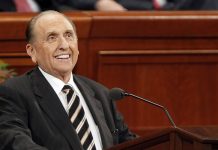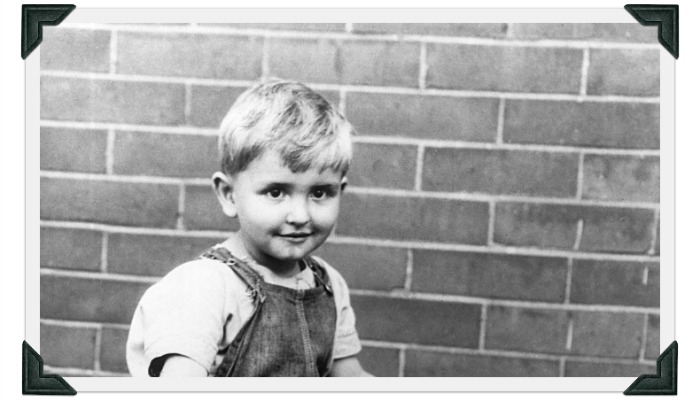
President Thomas S. Monson has been a leader in the Church for so long, sometimes it’s hard to remember that he was a kid once, too. And with such an extensive repertoire of church talks, Ensign articles and BYU devotionals, we have access to plenty of stories of young Tommy Monson that give us plenty of insight into his upbringing.
In addition to being inspiring, they’re also super adorable.
1. Tommy Monson and the Six Dogs:
Like everyone who isn’t a horrible monster, young Thomas S. loved dogs. According to an excerpt from his 2002 talk “Peace, Be Still,” he might have loved them a little too much:
“I recall how much, as a youngster, I liked dogs. One day I took my wagon and placed a wooden orange crate in it and went looking for dogs. At that time dogs were everywhere to be found: at school, walking along the sidewalks, or exploring vacant lots, of which there were many. As I would find a dog and capture it, I placed it in the crate, took it home, locked it in the coal shed, and turned the latch on the door. That day I think I brought home six dogs of varying sizes…I had no idea what I would do with all those dogs, so I didn’t reveal my deed to anyone.
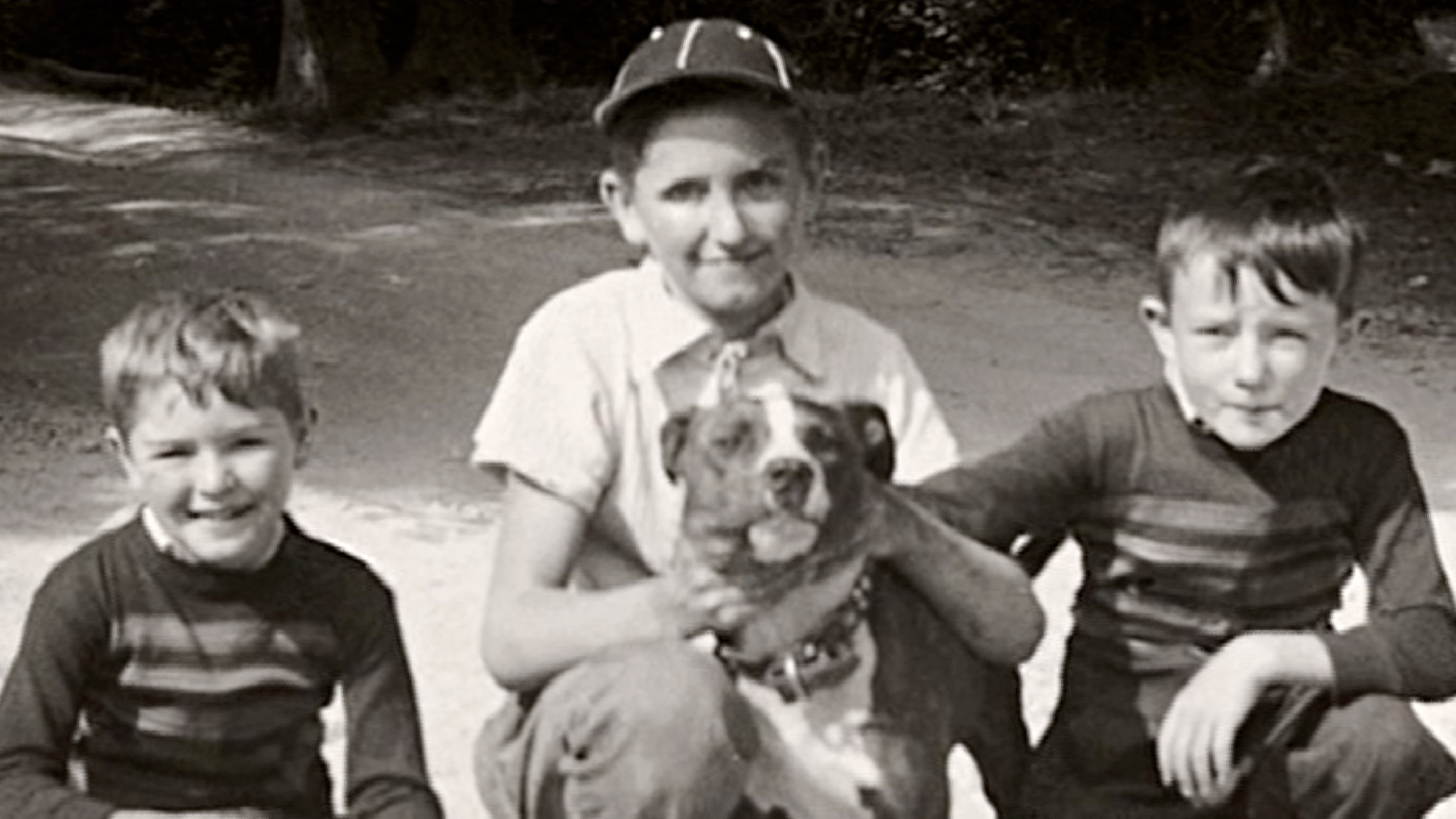 Dad came home from work and, as was his custom, took the coal bucket and went to the coal shed to fill it. Can you imagine his shock and utter consternation as he opened the door and immediately faced six dogs, all attempting to escape at once? As I recall, Dad flushed a little bit, and then he calmed down and quietly told me, ‘Tommy, coal sheds are for coal. Other people’s dogs rightfully belong to them.’ By observing him, I learned a lesson in patience and calmness.”
Dad came home from work and, as was his custom, took the coal bucket and went to the coal shed to fill it. Can you imagine his shock and utter consternation as he opened the door and immediately faced six dogs, all attempting to escape at once? As I recall, Dad flushed a little bit, and then he calmed down and quietly told me, ‘Tommy, coal sheds are for coal. Other people’s dogs rightfully belong to them.’ By observing him, I learned a lesson in patience and calmness.”
2. Tommy Monson and the Sandwiches
It’s sometimes hard to remember what an impact the Great Depression had upon average American citizens. President Monson never forgot. Growing up in the Depression era, he saw economic hardship up-close, but also witnessed kindness and charity. President Monson shared this childhood memory of a mother’s generosity on several occasions, such as in his 1987 talk, “The Will Within“:
“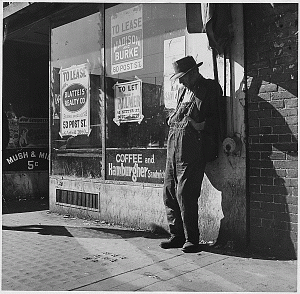 During the Great Depression, the homeless, the downtrodden, the unemployed “rode the rails” that passed not far from our home. On numerous occasions, there would be a soft knock on the back door. When I opened the door, there I would see a man, sometimes two, ill-clothed, ill-fed, ill-schooled. Generally, such a visitor held in his hand the familiar cap. His hair would be tousled, his face unshaven. The question was always the same: ‘Could you spare some food?’
During the Great Depression, the homeless, the downtrodden, the unemployed “rode the rails” that passed not far from our home. On numerous occasions, there would be a soft knock on the back door. When I opened the door, there I would see a man, sometimes two, ill-clothed, ill-fed, ill-schooled. Generally, such a visitor held in his hand the familiar cap. His hair would be tousled, his face unshaven. The question was always the same: ‘Could you spare some food?’
My dear mother invariably responded with a pleasant, ‘Come in and sit down at the table.’
She would then prepare a ham sandwich, cut a piece of cake, and pour a glass of milk. Mother would ask the visitor about his home, his family, his life. She provided hope and words of encouragement. Before leaving, the visitor would pause to express a gracious thank-you. I would note that a smile of content had replaced a look of despair. Eyes that were dull now shone with new purpose. Love, that noblest attribute of the human soul, can work wonders.”
3. Tommy Monson the Cowboy
No boy wants to grow up to be the prophet. Young Thomas Monson wanted to be a cowboy.
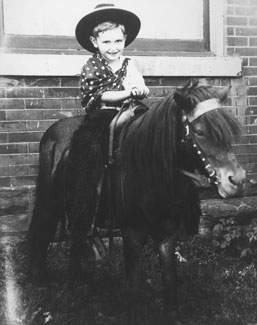 “When I was about nine years old and attending elementary school here in Salt Lake City, all of the youth in the city’s schools were asked to fill out a form indicating what we wanted to be when we grew up…As I sat with pencil in hand, I thought of the question, ‘What do I want to be when I grow up?’ Almost without hesitation, I wrote the word cowboy. At lunch that day I reported to my mother my response. I can almost see Mother now as she admonished me, ‘You get right back to school and change that to banker or lawyer!’ I obeyed Mother, and all dreams of being a cowboy vanished forever.”
“When I was about nine years old and attending elementary school here in Salt Lake City, all of the youth in the city’s schools were asked to fill out a form indicating what we wanted to be when we grew up…As I sat with pencil in hand, I thought of the question, ‘What do I want to be when I grow up?’ Almost without hesitation, I wrote the word cowboy. At lunch that day I reported to my mother my response. I can almost see Mother now as she admonished me, ‘You get right back to school and change that to banker or lawyer!’ I obeyed Mother, and all dreams of being a cowboy vanished forever.”
4. Tommy Monson and the Sunday School Money
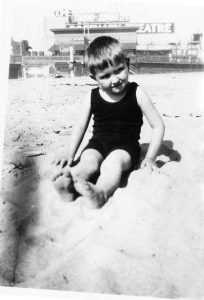 Young Thomas Monson was a lot like older Thomas Monson—kind, self-sacrificing, with an eye towards those who stand in special need. As a child, President Monson had several formative moments that shaped his singular “To the Rescue” message and motif. His tale of Sunday School charity foreshadowed a life spent giving to others:
Young Thomas Monson was a lot like older Thomas Monson—kind, self-sacrificing, with an eye towards those who stand in special need. As a child, President Monson had several formative moments that shaped his singular “To the Rescue” message and motif. His tale of Sunday School charity foreshadowed a life spent giving to others:
“We undertook a project to save nickels and dimes for what was to be a gigantic party…As boys and girls with typical appetites, we converted in our minds the monetary totals to cakes, cookies, pies, and ice cream. This was to be a glorious occasion—the biggest party ever. Never before had any of our teachers even suggested a social event like this one was going to be…
“None of us will forget that gray morning in January when our beloved teacher announced to us that the mother of one of our classmates had passed away. We thought of our own mothers and how much they meant to us. We felt sorrow for Billy Devenport in his great loss.
The lesson that Sunday was from the book of Acts, chapter 20, verse 35: ‘Remember the words of the Lord Jesus, how he said, It is more blessed to give than to receive.’ At the conclusion of the presentation of a well-prepared lesson, Lucy Gertsch commented on the economic situation of Billy’s family. These were depression times; money was scarce. With a twinkle in her eyes, she asked, ‘How would you like to follow this teaching of the Lord? How would you feel about taking your party fund and, as a class, giving it to the Devenports as an expression of our love?’ The decision was unanimous. We counted very carefully each penny and placed the total sum in a large envelope.
Ever shall I remember the tiny band walking those three city blocks, entering Billy’s home, greeting him, his brother, sisters, and father. Noticeably absent was his mother. Always I shall treasure the tears which glistened in the eyes of each one present as the white envelope containing our precious party fund passed from the delicate hand of our teacher to the needy hand of a grief-stricken father. We fairly skipped our way back to the chapel. Our hearts were lighter than they had ever been, our joy more full, our understanding more profound. This simple act of kindness welded us together as one. We learned through our own experience that indeed it is more blessed to give than to receive.”
5. Tommy Monson and the Electric Train
Young President Monson was proud of his electric train collection. One Christmas, when his parents told him they had bought a train set for Mark, a neighbor boy in need, Young Tommy became a little jealous of one of the train cars they were gifting him.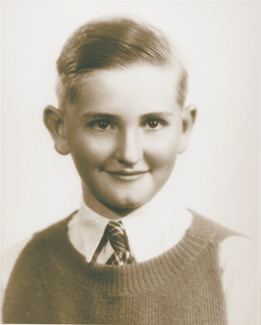
“My train had no such car, and pangs of envy began to be felt. I put up such a fuss that Mother succumbed to my pleadings and handed me the oil tanker car. She said, ‘If you need it more than Mark, you take it.’ I put it with my train set and felt pleased with the result.”
Tommy and his mother dropped off the train to Mark, but after seeing Mark’s poor living situation, our prophet-to-be felt terrible.
“Mother wisely asked, ‘What do you think of Mark’s train, Tommy?’
I felt a keen sense of guilt and became very much aware of my selfishness. I said to Mother, ‘Wait just a moment—I’ll be right back.’
As swiftly as my legs could carry me, I ran to our home, picked up the oil tanker car plus an additional car of my own, ran back down the lane to the Hansen home, and said joyfully to Mark, ‘We forgot to bring two cars which belong to your train.’
Mark coupled the two extra cars to his set. I watched the engine make its labored way around the track and felt a supreme joy difficult to describe and impossible to forget.”



